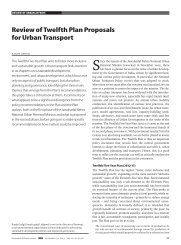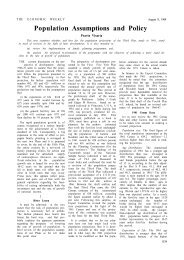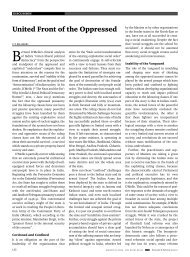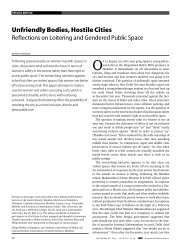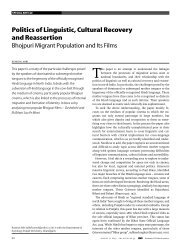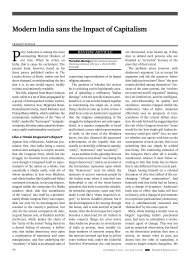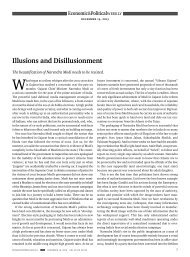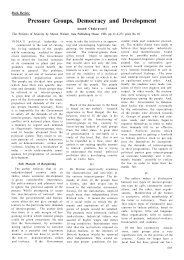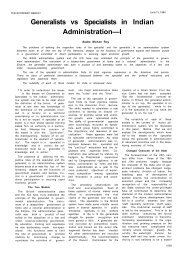Download PDF version - Economic and Political Weekly
Download PDF version - Economic and Political Weekly
Download PDF version - Economic and Political Weekly
Create successful ePaper yourself
Turn your PDF publications into a flip-book with our unique Google optimized e-Paper software.
POSTSCRIPT<br />
DOCUMENTARY FILMS | READINGS<br />
Some Lows, Many Highs<br />
Jhumpa Lahiri’s The Lowl<strong>and</strong> is intellectually <strong>and</strong><br />
emotionally captivating, even though some<br />
elements in the plot seem unconvincing.<br />
Shoma Sen<br />
A<br />
novel set against the backdrop of the Naxalite movement<br />
in Bengal in the late 1960s <strong>and</strong> the 1970s,<br />
Jhumpa Lahiri’s The Lowl<strong>and</strong> centres around family<br />
relationships. Udayan <strong>and</strong> Subhash, brothers in a lower<br />
middle-class family of Tollygunge, Kolkata, grow up as intensely<br />
close siblings, until Udayan is drawn into the Naxalite movement<br />
<strong>and</strong> Subhash leaves for further studies in the US. The<br />
140<br />
december 14, 2013 vol xlviII no 50 EPW <strong>Economic</strong> & <strong>Political</strong> <strong>Weekly</strong>
POSTSCRIPT<br />
READINGS | LITERARY FESTIVALS<br />
killing of his brother in a false encounter with the police<br />
brings Subhash back to India where he marries Udayan’s wife,<br />
Gauri, who is pregnant, <strong>and</strong> takes her off to Rhode Isl<strong>and</strong> to<br />
escape the conservative atmosphere in their Kolkata home.<br />
In the US Gauri gets drawn to academics <strong>and</strong> ultimately<br />
deserts her family <strong>and</strong> their daughter Bela to<br />
move away in pursuit of an independent career.<br />
Perhaps the most feminist of Lahiri’s novels, The<br />
Lowl<strong>and</strong> portrays two types of feminism – an individualistic<br />
kind of feminism in the character of<br />
Gauri, the Naxalite sympathizer, who ab<strong>and</strong>ons<br />
everything to pursue a career in philosophy, <strong>and</strong><br />
a kind of eco-feminism in her daughter, Bela.<br />
Ironically, it is Bela who ends up practising the lifestyle of a<br />
proletariat, taking up organic farming instead of higher<br />
studies, living an anti-capitalist lifestyle, <strong>and</strong> becoming a<br />
single, unwed mother.<br />
But more than ideology, it is rudiments of psychology that<br />
form the basis of Lahiri’s characterisation – the intense pain<br />
of the rejected child <strong>and</strong> the husb<strong>and</strong> who had wanted to do<br />
a good turn; the “selfishness” of the mother who could not be<br />
one; the ensuing guilt <strong>and</strong> trauma; <strong>and</strong> the ending of the<br />
novel indicating the possibility of a future bond between<br />
mother <strong>and</strong> daughter.<br />
Somewhat unconvincing to me, however, was the element<br />
of fate in the plot, where, like a 19th century novel,<br />
the mother who ab<strong>and</strong>ons her child never once tries to<br />
look her up, <strong>and</strong> the father <strong>and</strong> daughter leave her to her<br />
new life without staking any claims. Except for some efforts<br />
of Gauri at Googling into their past, this extremely cold<br />
response to the only relatives <strong>and</strong> friends she had in the US<br />
– for a woman who grew up in a traditionally Indian<br />
atmosphere <strong>and</strong> spent some intense years with “comrades”<br />
– is difficult to swallow.<br />
I once heard of a Naxalite woman activist in Andhra<br />
Pradesh who had gone underground, leaving her infant<br />
daughter with her mother. Out of a deep emotional compulsion,<br />
one day she secretly appeared at their house <strong>and</strong> rang<br />
the doorbell. The girl opened the door <strong>and</strong> yelled out to her<br />
gr<strong>and</strong>mother that some stranger of a woman was st<strong>and</strong>ing<br />
outside – the moment of reunion was rendered even more<br />
pathetic for the activist mother.<br />
But that the same situation should happen in “normal”<br />
circumstances in the US makes one wonder whether the<br />
social life <strong>and</strong> culture of this country led to the changes that<br />
made Gauri feel that individual freedom <strong>and</strong> growth were a<br />
priority to her at the cost of everything else. Or, like a character<br />
from Hardy or Bronte, was it fate that moved mother <strong>and</strong><br />
daughter completely apart only to bring them together after<br />
a gap of about 20 years?<br />
Though Lahiri’s attempt at researching <strong>and</strong> recapturing<br />
the traumatic lives of activists <strong>and</strong> their families living in<br />
the Kolkata of that period is commendable for striking a<br />
genuine chord, the sections of The Lowl<strong>and</strong> that are based<br />
... more than<br />
ideology, it is<br />
rudiments of<br />
psychology<br />
that form the<br />
basis of Lahiri’s<br />
characterisation<br />
on life in Rhode Isl<strong>and</strong> are more the quintessential Lahiri.<br />
The use of short sentences <strong>and</strong> hyperbole, in the parts<br />
tracing the Naxalite movement, give way to longer, descriptive<br />
sentences that detail life in the diasporic situation.<br />
The characterisation of Udayan <strong>and</strong> Subhash’s parents,<br />
<strong>and</strong> the narration of Udayan’s arrest <strong>and</strong> killing,<br />
are movingly executed.<br />
The description of the lower middle-class<br />
Bengali life in the late 1960s <strong>and</strong> the 1970s, the<br />
romancing of Gauri <strong>and</strong> Udayan, the patriarchal<br />
practices <strong>and</strong> social movements in the society<br />
of that era, the house in the lowl<strong>and</strong>s, <strong>and</strong><br />
the aged mother paying tributes at her son’s<br />
memorial service, are images that will remain permanently<br />
imprinted in memory. The non-linear narrative <strong>and</strong> the intermingling<br />
of the personal <strong>and</strong> the political in plot construction<br />
bind the work securely, adding interest <strong>and</strong> suspense<br />
to a novel that entraps the reader both intellectually<br />
<strong>and</strong> emotionally.<br />
Shoma Sen (shomasen@hotmail.com) teaches English literature at Nagpur University.<br />
<strong>Economic</strong> & <strong>Political</strong> <strong>Weekly</strong> EPW december 14, 2013 vol xlviII no 50 141



